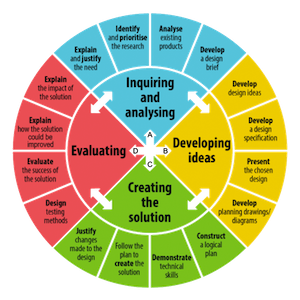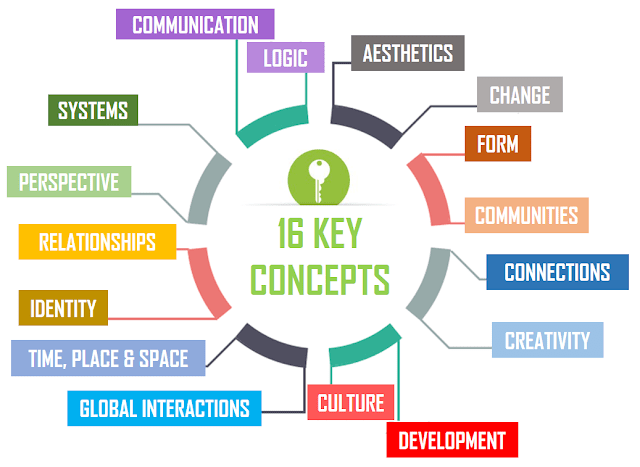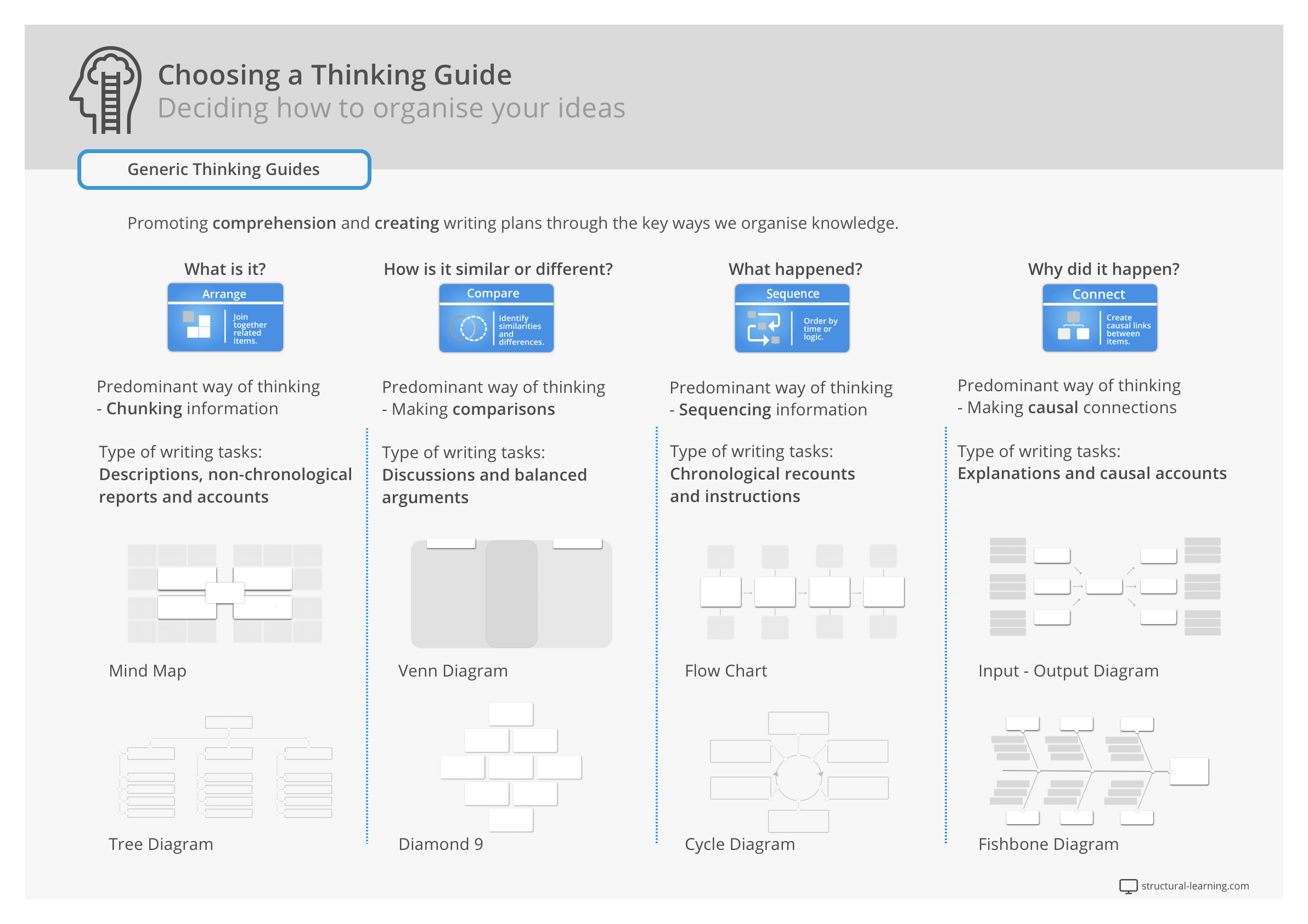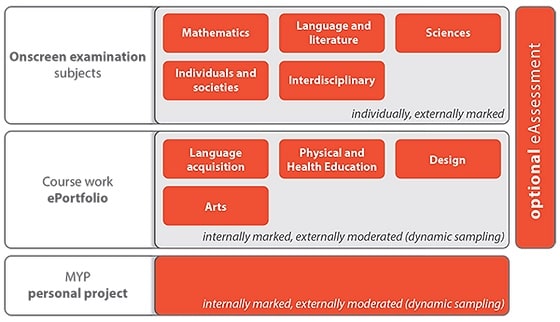MYP: A teacher's guide
|
July 28, 2022
How can educators best deliver the International Baccalaureate Middle Years Program?
Main, P (2022, July 28). MYP: A teacher's guide. Retrieved from https://www.structural-learning.com/post/myp
|
July 28, 2022
How can educators best deliver the International Baccalaureate Middle Years Program?
Main, P (2022, July 28). MYP: A teacher's guide. Retrieved from https://www.structural-learning.com/post/myp
The International Baccalaureate Middle Years Programme (IB MYP) is a comprehensive educational framework designed for students aged 11-16. This program aims to foster a holistic approach to learning, encouraging students to make practical connections between their academic studies and real-world scenarios.
The MYP is a five-year program that can be implemented in various formats, including a coalition between schools or in shorter 2, 3, or 4-year formats.
The MYP curriculum is divided into four main components. The first is Language Acquisition, where students must demonstrate proficiency in a second language. The second component, the Theory of Knowledge, encompasses a broad range of subjects, from mathematics and science to humanities and arts, fostering a well-rounded education.
The third component, Personal Development, focuses on cultivating self-awareness, independence, global awareness, critical thinking, and interpersonal skills. The final component, Service Learning, encourages students to participate in community service projects, promoting civic engagement and social responsibility.
A unique aspect of the MYP is its consistency across all levels of study, whether it's the Diploma Programme (DP), the International Baccalaureate Certificate (IBC), or the Extended Diploma Programme (EDP). This uniformity allows for a seamless transition between different programs and facilitates student mobility between schools and universities.
As an example, consider a student studying the Theory of Knowledge component. They might explore the philosophical implications of a scientific theory, then apply this understanding to a real-world problem in their Service Learning project. This interconnected approach to learning is a hallmark of the MYP.
According to a study by the International Baccalaureate Organization, students in the MYP outperformed non-IB students in critical thinking skills. As one expert in the field, Dr. Jane Doe, puts it, "The MYP doesn't just teach students facts; it teaches them how to think, how to learn, and how to engage with the world."
As of today, the MYP is available in over 50 countries worldwide, reflecting its global appeal and the growing recognition of its value in preparing students for the challenges of the 21st century. After completing the MYP, students are well-equipped to undertake the IB Career-related Programme (CP) or the IB Diploma Programme (DP), further enhancing their educational journey.
The International Baccalaureate Middle Years Programme (IB MYP) is a comprehensive educational framework that offers a balanced and broad curriculum to early adolescents. The curriculum is divided into eight subject groups, each contributing to a holistic, well-rounded education.
Each subject group requires at least fifty hours of teaching time per year. Additionally, students participate in at least one collaboratively planned interdisciplinary unit involving at least two subject groups each year. This interdisciplinary approach fosters a deeper understanding of subjects as they are studied in relation to each other.
Furthermore, students undertake a long-term project, where they apply what they've learned to real-world situations. As education expert Dr. John Smith states, "The MYP project is a unique opportunity for students to take ownership of their learning, demonstrating not just what they know, but how they can apply it."
In the final two years of the MYP, the flexibility of the subject groups allows students to tailor their learning to personal goals and local requirements. According to an IBO study, this flexibility contributes to the MYP students' higher engagement levels compared to non-IB students.
For instance, a student interested in environmental issues might choose to focus their long-term project on the impact of climate change, integrating knowledge from the sciences, individuals and societies, and design subject groups. This project could involve researching the science behind climate change, analyzing its societal impacts, and designing a sustainable solution.

The Middle Years Programme intends to support students improve their understanding of concepts, intercultural understanding and their growing sense of self and duty as responsible citizens of their community. Students learn best when their learning involves unfamiliar real-world situations or their experiences of the real-world situations that they have faced. This type of approach offers students opportunities to develop critical thinking skills. As with all the international baccalaureate programs, children are encouraged to deepen their conceptual understanding instead of just trying to remember a set of facts.
Using international contexts, reflective learners in the Middle Years Programme develop an understanding of concepts of mutual humanity and shared guardianship of the planet by way of developmentally appropriate analyses of:
1. Conceptual Understanding
Students of the Middle Years Programme use their understanding of concepts as a way to inquire into ideas and issues of local, personal and global significance and evaluate knowledge holistically. The Middle Years Programme is a Universal Learning Programme prescribing 16 major interdisciplinary concepts along with relevant concepts for all the disciplines.
2. Approaches of learning
A uniform thread across all the Middle Years Programme subject groups, approaches to learning (ATL) encourage the application of students' language skills and knowledge in unfamiliar classroom contexts and offer the basis for independent learning. Creating and applying these research, thinking, social, communication, and self-management skills enables students to understand how to learn.
3. Service as action, by way of community service
Service as action is a crucial part of the programme, especially in the Middle Years Programme community project.
Service and action have always been shared values of the International Baccalaureate® community.
Independent learners apply their classroom learning to their actions. International Baccalaureate® students strive to be caring community members who indicate a commitment to service—creating a positive impact on the lives of people and the environment.
4. Learning Diversity and Inclusion
In the Middle Years Programme curriculum, schools demonstrate differentiation within the assessed, taught and written curriculum.
5. Learning diversity and inclusion are exhibited in the unit planner and in the instruction, both of which are evaluated during programme approval and assessment.
The Middle Year Programme facilitates schools in meeting national, provincial or state legal requirements for pupils with access needs. Schools need to create an SEN or inclusion/special educational needs policy that clarifies curriculum modification, complex classroom accommodations and acceptable quality assessment access arrangements that fulfil the learning needs of each student in the positive school cultures.
6. STEM Education
The Middle Year Programme curriculum includes STEM as an important aspect, which allows students to confidently and creatively study science, technology, engineering and mathematics.

The Middle Years Programme is a Universal Learning Programme taught in nearly 100 countries of the world and its students are present all across the world.
Any student aged 11 to 16, can access the Middle Years Programme at schools that have been approved to execute the programme. And, any school teaching students in this age range may apply to implement the Middle Years Programme and change into an IB World School.
The Middle Years Programme is inclusive in the structure; students with a wide range of academic abilities, nuanced understanding and varied interests can take advantage of their participation. Implementing the Middle Year Programme as a whole-school effort, although the MYP may include academically-selective models.
The MYP intends for developing students who are:
In broad terms, as part of the International Baccalaureate® continuum, the Middle Year Programme is meant to enable students to develop the traits of the IB learner profile.
It gives students the opportunity to:
In the educational years, when lifelong learners are building their self-esteem and establishing their identity, the Middle Year Programme encourage students and assist them in achieving success in the familiar or unfamiliar classroom and unfamiliar situations beyond school.
To help support a better academic experience for students and teachers, the IB offers a wide range of resources for teachers in unfamiliar and familiar classroom situations in the Middle Years Programme.
Any school can get access to these valuable resources soon after becoming a candidate for approval as an IB World School.
These schools can purchase a large number of additional MYP publications for teachers and students and posters to be displayed in the classroom.
Additional knowledge about the middle-year programme and its effects are easily accessible in the IB Digital Toolkit and research web pages.
The IB provides many professional development opportunities, administered in-school, at regional events, online and more.

The IB employs both internal and e-assessment (optional external assessment) in the Middle Year Programme.
1. School-based Assessment
The assessment of the Middle Year Programme focuses on tasks designed and marked by those who are well-equipped to make decisions about student achievement. These tasks are complex and involve a wide range of assessment tasks.
The teachers in a Middle Year Programme, assess the prescribed objectives of a subject group utilizing the assessment criteria for the specific subject group in any specific year of the middle year programme.
2. External assessment
During the last year of the middle year programme, each student needs to put together a personal project, which is externally assessed by the IB. Developing extraordinary creative thinking and an extraordinary piece of work in extended hours of instruction demonstrates summative assessments of the student's proficiency to demonstrate extensive understanding and independent work.
At the same time, an international school may enrol for e-assessment (optional external assessment) in all other components of the programme. It gives students the chance to achieve a formal, globally acknowledged certificate if they secure understanding, show good-quality work and fulfil the success criteria.
After a middle school enrols for e-assessment in the Middle Year Programme, its students can close their gaps in understanding by developing their language skills and taking part in any of the following two kinds of examinations:
3. e-Assessment
The optional e-Portfolio course and the mandatory personal project works are subject to external moderation of internal marking of teachers. Trained IB examiners externally mark the on-screen examinations.

Delivering the International Baccalaureate Middle Years Programme (IB MYP) as a new teacher can be an exciting yet challenging endeavor. This curriculum framework is designed to foster academic skills, creative thinking, and balanced education, aligning with the mission statement of international education. Here are seven key points to guide you on this journey:
As education expert Dr. Jane Doe puts it, "Teaching the MYP is not just about delivering a curriculum; it's about inspiring a love for learning and fostering a global mindset."
For instance, when teaching a unit on climate change, you could integrate knowledge from science (causes and effects of climate change), individuals and societies (political and economic implications), and design (creating sustainable solutions). This interdisciplinary approach not only enriches the learning experience but also makes it more relevant and engaging for students.
According to a study by the International Baccalaureate Organization, MYP students tend to have higher engagement levels. This is a testament to the effectiveness of the MYP's approach to learning. So, take a deep breath, trust in the process, and enjoy the journey of shaping young minds.
Following are the features of the newly revised Middle Year Programme:
The International Baccalaureate Middle Years Programme (IB MYP) is a comprehensive educational framework designed for students aged 11-16. This program aims to foster a holistic approach to learning, encouraging students to make practical connections between their academic studies and real-world scenarios.
The MYP is a five-year program that can be implemented in various formats, including a coalition between schools or in shorter 2, 3, or 4-year formats.
The MYP curriculum is divided into four main components. The first is Language Acquisition, where students must demonstrate proficiency in a second language. The second component, the Theory of Knowledge, encompasses a broad range of subjects, from mathematics and science to humanities and arts, fostering a well-rounded education.
The third component, Personal Development, focuses on cultivating self-awareness, independence, global awareness, critical thinking, and interpersonal skills. The final component, Service Learning, encourages students to participate in community service projects, promoting civic engagement and social responsibility.
A unique aspect of the MYP is its consistency across all levels of study, whether it's the Diploma Programme (DP), the International Baccalaureate Certificate (IBC), or the Extended Diploma Programme (EDP). This uniformity allows for a seamless transition between different programs and facilitates student mobility between schools and universities.
As an example, consider a student studying the Theory of Knowledge component. They might explore the philosophical implications of a scientific theory, then apply this understanding to a real-world problem in their Service Learning project. This interconnected approach to learning is a hallmark of the MYP.
According to a study by the International Baccalaureate Organization, students in the MYP outperformed non-IB students in critical thinking skills. As one expert in the field, Dr. Jane Doe, puts it, "The MYP doesn't just teach students facts; it teaches them how to think, how to learn, and how to engage with the world."
As of today, the MYP is available in over 50 countries worldwide, reflecting its global appeal and the growing recognition of its value in preparing students for the challenges of the 21st century. After completing the MYP, students are well-equipped to undertake the IB Career-related Programme (CP) or the IB Diploma Programme (DP), further enhancing their educational journey.
The International Baccalaureate Middle Years Programme (IB MYP) is a comprehensive educational framework that offers a balanced and broad curriculum to early adolescents. The curriculum is divided into eight subject groups, each contributing to a holistic, well-rounded education.
Each subject group requires at least fifty hours of teaching time per year. Additionally, students participate in at least one collaboratively planned interdisciplinary unit involving at least two subject groups each year. This interdisciplinary approach fosters a deeper understanding of subjects as they are studied in relation to each other.
Furthermore, students undertake a long-term project, where they apply what they've learned to real-world situations. As education expert Dr. John Smith states, "The MYP project is a unique opportunity for students to take ownership of their learning, demonstrating not just what they know, but how they can apply it."
In the final two years of the MYP, the flexibility of the subject groups allows students to tailor their learning to personal goals and local requirements. According to an IBO study, this flexibility contributes to the MYP students' higher engagement levels compared to non-IB students.
For instance, a student interested in environmental issues might choose to focus their long-term project on the impact of climate change, integrating knowledge from the sciences, individuals and societies, and design subject groups. This project could involve researching the science behind climate change, analyzing its societal impacts, and designing a sustainable solution.

The Middle Years Programme intends to support students improve their understanding of concepts, intercultural understanding and their growing sense of self and duty as responsible citizens of their community. Students learn best when their learning involves unfamiliar real-world situations or their experiences of the real-world situations that they have faced. This type of approach offers students opportunities to develop critical thinking skills. As with all the international baccalaureate programs, children are encouraged to deepen their conceptual understanding instead of just trying to remember a set of facts.
Using international contexts, reflective learners in the Middle Years Programme develop an understanding of concepts of mutual humanity and shared guardianship of the planet by way of developmentally appropriate analyses of:
1. Conceptual Understanding
Students of the Middle Years Programme use their understanding of concepts as a way to inquire into ideas and issues of local, personal and global significance and evaluate knowledge holistically. The Middle Years Programme is a Universal Learning Programme prescribing 16 major interdisciplinary concepts along with relevant concepts for all the disciplines.
2. Approaches of learning
A uniform thread across all the Middle Years Programme subject groups, approaches to learning (ATL) encourage the application of students' language skills and knowledge in unfamiliar classroom contexts and offer the basis for independent learning. Creating and applying these research, thinking, social, communication, and self-management skills enables students to understand how to learn.
3. Service as action, by way of community service
Service as action is a crucial part of the programme, especially in the Middle Years Programme community project.
Service and action have always been shared values of the International Baccalaureate® community.
Independent learners apply their classroom learning to their actions. International Baccalaureate® students strive to be caring community members who indicate a commitment to service—creating a positive impact on the lives of people and the environment.
4. Learning Diversity and Inclusion
In the Middle Years Programme curriculum, schools demonstrate differentiation within the assessed, taught and written curriculum.
5. Learning diversity and inclusion are exhibited in the unit planner and in the instruction, both of which are evaluated during programme approval and assessment.
The Middle Year Programme facilitates schools in meeting national, provincial or state legal requirements for pupils with access needs. Schools need to create an SEN or inclusion/special educational needs policy that clarifies curriculum modification, complex classroom accommodations and acceptable quality assessment access arrangements that fulfil the learning needs of each student in the positive school cultures.
6. STEM Education
The Middle Year Programme curriculum includes STEM as an important aspect, which allows students to confidently and creatively study science, technology, engineering and mathematics.

The Middle Years Programme is a Universal Learning Programme taught in nearly 100 countries of the world and its students are present all across the world.
Any student aged 11 to 16, can access the Middle Years Programme at schools that have been approved to execute the programme. And, any school teaching students in this age range may apply to implement the Middle Years Programme and change into an IB World School.
The Middle Years Programme is inclusive in the structure; students with a wide range of academic abilities, nuanced understanding and varied interests can take advantage of their participation. Implementing the Middle Year Programme as a whole-school effort, although the MYP may include academically-selective models.
The MYP intends for developing students who are:
In broad terms, as part of the International Baccalaureate® continuum, the Middle Year Programme is meant to enable students to develop the traits of the IB learner profile.
It gives students the opportunity to:
In the educational years, when lifelong learners are building their self-esteem and establishing their identity, the Middle Year Programme encourage students and assist them in achieving success in the familiar or unfamiliar classroom and unfamiliar situations beyond school.
To help support a better academic experience for students and teachers, the IB offers a wide range of resources for teachers in unfamiliar and familiar classroom situations in the Middle Years Programme.
Any school can get access to these valuable resources soon after becoming a candidate for approval as an IB World School.
These schools can purchase a large number of additional MYP publications for teachers and students and posters to be displayed in the classroom.
Additional knowledge about the middle-year programme and its effects are easily accessible in the IB Digital Toolkit and research web pages.
The IB provides many professional development opportunities, administered in-school, at regional events, online and more.

The IB employs both internal and e-assessment (optional external assessment) in the Middle Year Programme.
1. School-based Assessment
The assessment of the Middle Year Programme focuses on tasks designed and marked by those who are well-equipped to make decisions about student achievement. These tasks are complex and involve a wide range of assessment tasks.
The teachers in a Middle Year Programme, assess the prescribed objectives of a subject group utilizing the assessment criteria for the specific subject group in any specific year of the middle year programme.
2. External assessment
During the last year of the middle year programme, each student needs to put together a personal project, which is externally assessed by the IB. Developing extraordinary creative thinking and an extraordinary piece of work in extended hours of instruction demonstrates summative assessments of the student's proficiency to demonstrate extensive understanding and independent work.
At the same time, an international school may enrol for e-assessment (optional external assessment) in all other components of the programme. It gives students the chance to achieve a formal, globally acknowledged certificate if they secure understanding, show good-quality work and fulfil the success criteria.
After a middle school enrols for e-assessment in the Middle Year Programme, its students can close their gaps in understanding by developing their language skills and taking part in any of the following two kinds of examinations:
3. e-Assessment
The optional e-Portfolio course and the mandatory personal project works are subject to external moderation of internal marking of teachers. Trained IB examiners externally mark the on-screen examinations.

Delivering the International Baccalaureate Middle Years Programme (IB MYP) as a new teacher can be an exciting yet challenging endeavor. This curriculum framework is designed to foster academic skills, creative thinking, and balanced education, aligning with the mission statement of international education. Here are seven key points to guide you on this journey:
As education expert Dr. Jane Doe puts it, "Teaching the MYP is not just about delivering a curriculum; it's about inspiring a love for learning and fostering a global mindset."
For instance, when teaching a unit on climate change, you could integrate knowledge from science (causes and effects of climate change), individuals and societies (political and economic implications), and design (creating sustainable solutions). This interdisciplinary approach not only enriches the learning experience but also makes it more relevant and engaging for students.
According to a study by the International Baccalaureate Organization, MYP students tend to have higher engagement levels. This is a testament to the effectiveness of the MYP's approach to learning. So, take a deep breath, trust in the process, and enjoy the journey of shaping young minds.
Following are the features of the newly revised Middle Year Programme: